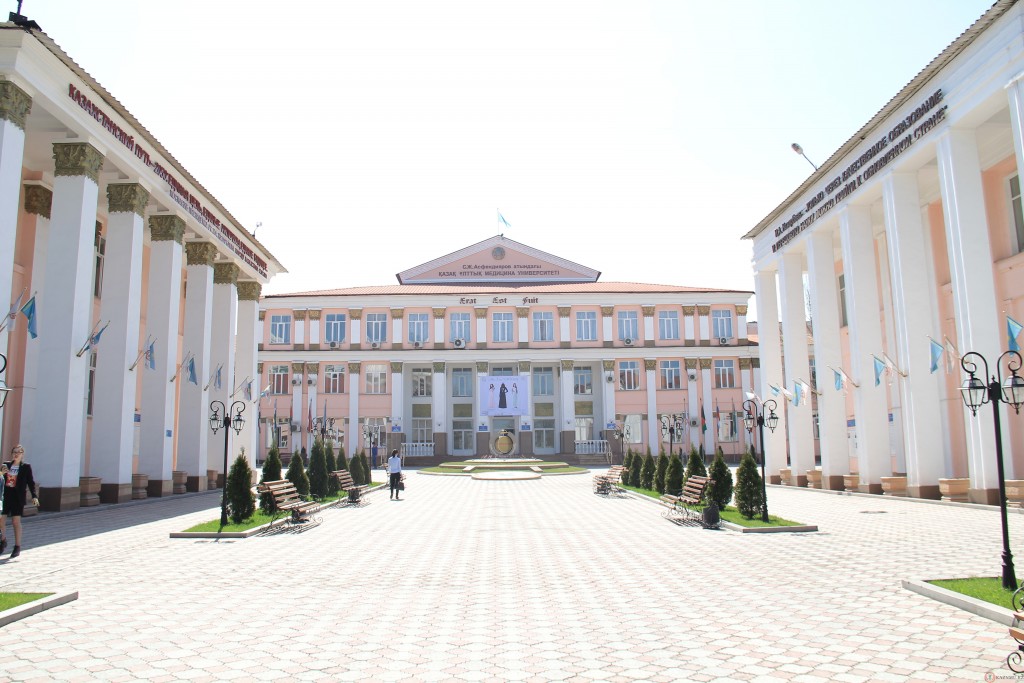31 May 2013
UTK: 615.1-336.121-338.45(574)
U.M. Datkhayev, A.S. Nemchenko, A.R. Shopabayeva, N.Zh. Zhumabayev,
K.S. Zhakipbekov, E.K. Orazbekov
Kazakh National Medical University named of S.D. Asfendiyarov, Almaty, Kazakhstan
National University of Pharmacy, Kharkov, Ukraine
South Kazakhstan State Pharmaceutical Academy, Shymkent, Kazakhstan
Modernization of existing facilities and construction of new pharmaceutical companies is a mega-project at the regional level, which requires knowledge and skills in organizational design. In this article the basic design principles of the pharmaceutical industry in the Republic of Kazakhstan meeting the requirements and rules of GMP and ISO international standards were determined.
Keywords: Pharmaceutical industry, the principles of design, organizational design, GMP, ISO.
Transition of enterprises to a modern level, creating effective production that could become competitive on a global scale is a complex and demanding task that requires knowledge and skills in business, organizational designing (engineering), informational technology, training, and many other areas. Just correct and balanced implementation of any project, as well as reasonable and balanced investments is a pledge of high quality and competitiveness in the market.
Designing (Engineering) is among the most important processes for the project, as a result of its implementation is the development of the unique facilities, goods or services [1, 2, 3, 4].
From the methodological point of view, the process designing of industrial enterprise is a transformation process, leading to processing raw data due to the given tasks, by means of instructions, formulas and calculations, variants of solutions for interim or final results, ie in the output data draft.
Designing has its own methodology, which includes the structure of the principles and norms of activity, subject, object and its model methods.
Principles of designing production is starting positions, general requirements, rules of the formation of the production systems and conditions for their proceeding [5, 6, 7]. Principles of designing pharmaceutical industry, in addition to general design principles of production, are based on industry specifics.
For the designing of the pharmaceutical industry in the Republic of Kazakhstan, we identified the basic principles, which are subdivided into three groups (Fig. 1):
— general principles for the designing of production systems;
— specific principles for the designing of the pharmaceutical industry;
— principles taking into account regional differences.
Figure 1 – Principles of designing the pharmaceutical industry in the Republic of Kazakhstan
The above principles are closely intertwined in each production phenomenon, are specified in separate regulations of designing pharmaceutical manufactures.
Group 1 principles. General principles for the designing of production systems.
Principle of systems. It suggests that the pharmaceutical industry is a complex, multi-level socio-economic system consisting of interconnected, interacting, balanced in time and space subsystems, which in some external surroundings fulfill the goal set for the system as a whole.
The principle of an object orientation. It is accomplished by constructing tree goals, and using program – based and network planning.
The principle of a phased approach. Planning from general to specific (ie, gradually increasing concretization). Particular problems as possible differentiate and distribute the stages for consistent designing.
The principle of correspondence of production organizational forms to its technical and economic content. It requires the formation of an organizational structure taking into account the features of production processes and conditions of their occurrence.
The principle of urgency. Transformation of random, unstable, disordered structural connections, relationships and the corresponding structures to stable and regulated.
The principle of concentration. Subordination of the individual functions for implementing a single system of function to get the desired effect.
The principle of cyclicity. According to the cyclicity of material world — the structure, the vital cycles of various elements of the production system have the sequence of the stages.
The principle of continuous improvement. According to the law of instability of the production system, the work is needed to increase the level of its organization.
The principle of control. Using the principles of scientific management of lab our.
The principle of integration and coordination. It defines the basic function of a project manager.
The principle of experience. All experience gained in the design process should be recorded and transferred for use in other phases of the designing and organizing projects.
The principle of parallelism. Building a process that enables the simultaneous designing component subsystems, elements, links of the production system.
The principle of digitalization. Involves the use of electronics.
The principle of monitoring changes in the project. All the processes of the project must be carefully controlled.
Quality management principles. The standards of RK ISO 9001-2001 [8] have 8 quality management principles:
a) Customer focus. Organizations depend on their customers and therefore should understand current needs, meet customer requirements and strive to exceed their expectations.
b) Leadership. Leaders establish unity of purpose and direction of the organization. They should create and maintain the internal environment in which people can become fully involved in achieving the organization’s objectives.
c) Involvement of people. People at all levels are the essence of an organization and their full involvement enables organizations to capitalize their ability with benefit.
d) The process approach. The desired result is achieved more efficiently when activities and related resources are managed as a process.
e) System approach to management. Identifying, understanding and managing interrelated processes as a system, promote the efficiency and effectiveness of the organization in achieving its objectives.
f) Continuous improvement. Continual improvement of the organization as a whole, should be regarded as a permanent objective.
g) Decision making based on facts. Effective decisions are based on the analysis of data and information.
h) Mutually beneficial supplier relationships. An organization and its suppliers are interdependent and a mutually beneficial relationship enhances the ability of both sides to create value.
The principle of unity of social, economic and technological solutions. It defines the relationship of social factors to the optimization of the economic and technological solutions.
The principle of information sufficiency. It defines the requirements for the information, its accuracy, timeliness, completeness, etc.
The principle of reliability. The property of the production system to maintain stability in the small, within the established standard in time and in space.
The principle of specialization. It is a form of organization of the production process, in which a given workplace, site shop, divisions of the production system is concentrated on production of similar products, as well as the minimum number of manufacturing processes and operations.
The principle of proportionality. It is to quantify the proportionality (combination) of the elements of the production process: the output parameters of the elements of performance, capacity, production (main and auxiliary serving) and coordination of bonds.
The principle of optimality. The design of all the processes for the production of products in a given amount and time and with the greatest economic efficiency and the lowest cost of labor and material resources.
The principle of continuity. Assumes the shape of the production process, in which all of its operations are carried out continuously, without interruption, and all the intermediate components of products continuously move from stage to the operation.
The principle of concentration. It means focusing on perform of certain manufacturing operations for the production of technologically similar products at individual workplaces, sites, in workshops or production company.
The principle of compatibility. Creating unity of appropriate operating elements and their relationships in the organization of the system.
The principle of consistency. Continuous following the implementation of productional (technological) operations.
The principle of competitiveness. Production design, producing products that can compete.
The principle of flexibility. Organization of production, capable of rapidly under certain characteristics of the elements of the production system, to reorganize producing other products, or change any of its components.
The principle of cost-effectiveness of the design. It is important to estimate the real cost of the required design.
Uniflow principle. Building a technological process that excludes «reverse» of the produced products, equipment placement during the process.
The principle of automaticity. The construction of technological process, in which partial processes and the manufacturing process, in general, are performed automatically (mechanisms) for the maximum possible economically and technologically grounded releasing from manual labor.
The principle of ecology. Enforcement of environmental rules and regulations, excluding harmful influence not only on the production processes and wastes on the environment, but also the impact of the environmental situation in the area of locating production on quality of production.
2nd group of principles. Specific guidelines for the design of the pharmaceutical industry.
The principle of standardization (implementation of GMP, ISO guidelines). It involves the use of obligatory conditions, control points, providing the best course of the manufacturing process and output of quality products.
The principle of the quality of medicines. The main principle of GMP is the quality of medicines should be provided with the technology and organization of production so that the products do not meeting the requirements will not be able to appear.
The principle of variance. Compulsory examination of fundamentally valid options of project for creating the pharmaceutical industry.
Principle of integrated designing. Need for a multidisciplinary approach to design pharmaceutical plants.
The principle of cross-contamination. Compliance with regulatory and technical documents, providing technical measures, procedures and precautions during the process to be followed to avoid the risk of cross contamination.
The principle of trained personnel. Production of drugs should be completed with the necessary number of professionals with the proper skills and experience.
The 3d group of principles. Principles that take into account regional differences.
Sufficiency principle of regional resources — natural, labor, financial, etc.
The principle of preserving the ecological balance. It’s provides environmental management.
The principle of creating an economically viable industry for the economy of the Republic of Kazakhstan.
The principle of improving the health of the country through the creation of regional pharmaceutical industry.
The principle of integration of the economy of the Republic of Kazakhstan to the world market of the EU, CIS, SCO. Establish close cooperative and investment cooperation with the EU, CIS, SCO.
Thus, we have defined the basic principles of organizational design for the pharmaceutical industry of the Republic of Kazakhstan, which are divided into 3 groups: general principles for the design of production systems, specific guidelines for the design of the pharmaceutical industry, the principles that take into account regional differences.
References
1 Paramonov, F.I., Soldak, J.M. Theoretical foundations of industrial management /F.I. Paramonov, J.M. Soldak// — M.: BINOM. Knowledge Laboratory, 2003. – 280 p.
2 A Guide to the Project Management Body of Knowledge. Project Management Institute. — New York: 1996.
3 Angyris, C. Intervention Theory and Methods: Reading/ C. Angyris. — Mass: Addison — Wesley, 1970
4 Ralf L. Kliem, Irwin S. Ludin. Project management practitioner’s handbooks — Amacom American Management Association, 1998.
5 Antonov, A.N., Morozov, L.S. Fundamentals of modern production/ A.N. Antonov, L.S. Morozov. — M.: Business and Services, 2004. – 432 p.
6 Ershov, V.F. Business planning/ V.F. Ershov. — St.P: Peter, 2005. – 288 p.
7 Lieberman, I. Planning for the enterprise/I. Lieberman. — M.: Publishing RIOR, 2005. – 127 p.
8 RK ISO 9001-2001. Quality management system. Requirements.
У.М. Датхаев, А.С. Немченко, А.Р. Шопабаева, Н.Ж. ЖҰмабаев,
К.С. ЖаҚЫпбеков, Е.К. Оразбеков
Қазақстан республикасындағы фармацевтикалық өнеркәсіпті жобалаудың қағидалары
Түйін: Қолданыстағы өндiрiстердi жаңғырту және жаңа фармацевтикалық кәсiпорындар салу ұйымдық жобалау бойынша білім мен дағдыларды талап ететін аймақтық деңгейдегі мегажоба болып саналады. Бұл мақалада GMP және ISO Халықаралық стандарттарының талаптары мен тәртіптерін есекере отырып, Қазақстан Республикасында фармацевтикалық өнеркәсіпті жобалаудың негізгі қағидалары анықталған.
Кілт сөздер: фармацевтикалық өнеркәсіп, жобалау қағидалары, ұйымдық жобалау, GMP, ISO.
У.М. Датхаев, А.С. Немченко, А.Р. Шопабаева, Н.Ж. Жумабаев,
К.С. Жакипбеков, Е.К. Оразбеков
Принципы проектирования фармацевтической промышленности в Республике Казахстан
Резюме: Модернизация действующих производств и строительство новых фармацевтических предприятий является мегапроектом регионального уровня, который требует знаний и навыков в организационной проектирований. В данной статье определены основные принципы проектирования фармацевтической промышленности в Республике Казахстан, с учетом требований и правил международных стандартов GMP и ISO.
Ключевые слова: Фармацевтическая промышленность, принципы проектирования, организационное проектирование, GMP, ISO.
PRINCIPLES OF DESIGNING THE PHARMACEUTICAL INDUSTRY IN KAZAKHSTAN

 English
English Қазақ тілі
Қазақ тілі









